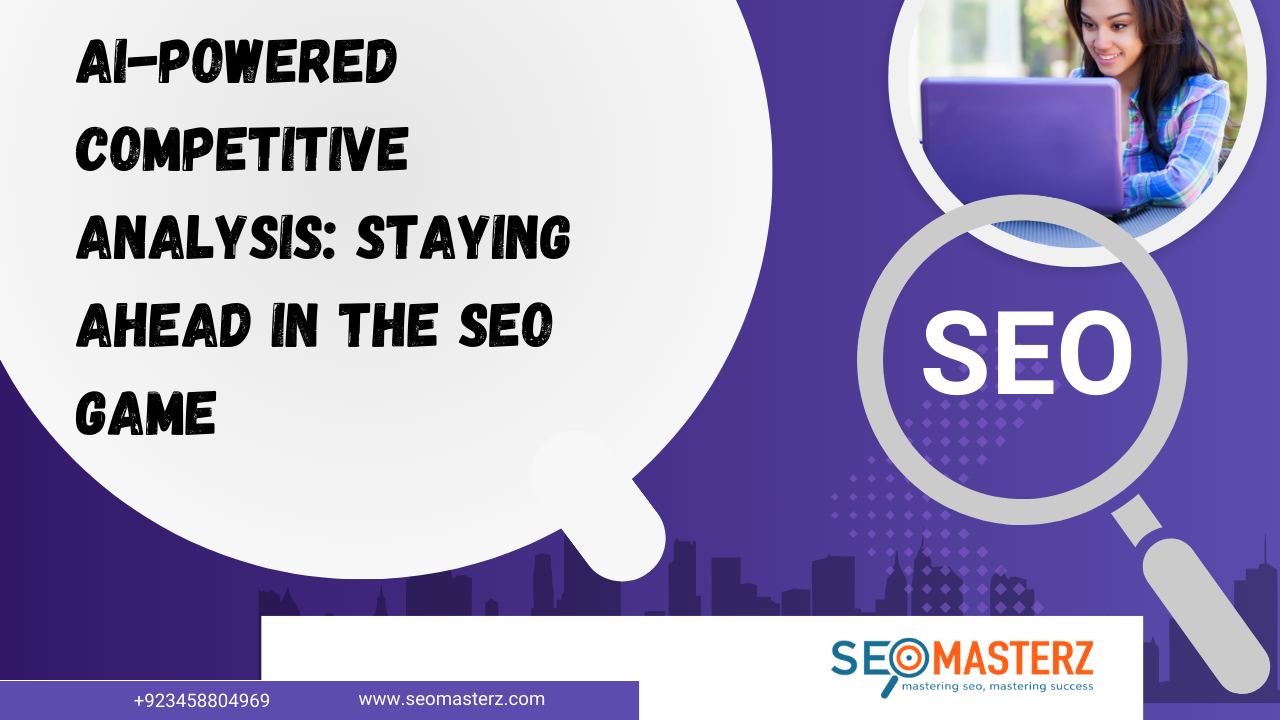It takes more than just keywords and backlinks to stay ahead of the competition in the quick-paced realm of Search Engine Optimisation (SEO). The way companies plan their online presence has changed as a result of the incorporation of artificial intelligence (AI) into competitive analysis. Deeper insights, quicker analysis, and practical tactics to beat competitors in the SEO game are all made possible by AI-powered tools and methodologies. This article examines how companies can stay ahead of the competition by identifying opportunities, refining tactics, and preserving a competitive edge with AI-driven competitive analysis.
Understanding Competitive Analysis in SEO
In SEO, competitive analysis entails looking at the tactics of your rivals, determining their advantages and disadvantages, and using the knowledge gained to enhance your own performance. Conventional approaches were labour-intensive and less accurate, relying on manual research and a small number of tools.
By analysing enormous databases, automating data collecting, and providing predictive insights, artificial intelligence has completely changed this process. Instead of spending endless hours collecting data, this change enables SEO specialists to concentrate on strategy and execution.
The Role of AI in Competitive Analysis
AI enhances competitive analysis by providing advanced capabilities that are otherwise impossible through manual methods. Here’s how AI is transforming competitive analysis in SEO:
1. Competitor Keyword Analysis
AI-powered tools analyze competitor websites to uncover their top-performing keywords. This includes:
- Identifying the keywords driving traffic to competitor pages.
- Highlighting keyword gaps that your site can target.
- Predicting keyword trends based on historical data and AI algorithms.
Example Tools: SEMrush, Ahrefs, and Moz integrate AI to provide comprehensive keyword insights.
2. Content Performance Evaluation
AI evaluates the performance of competitor content by analyzing metrics like engagement, shares, and backlinks. It can:
- Identify which topics resonate with their audience.
- Suggest content formats that perform best (e.g., blogs, videos, or infographics).
- Highlight underperforming competitor content for potential improvement opportunities.
Example Tools: BuzzSumo and MarketMuse use AI to assess content quality and engagement.
Advanced AI Techniques for SEO Competitive Analysis
1. Sentiment Analysis for Branding
AI uses Natural Language Processing (NLP) to perform sentiment analysis on competitor brand mentions. By analyzing how audiences perceive your competitors, you can tailor your messaging and branding strategies to address gaps or leverage strengths.
2. Predictive Analytics for Market Trends
AI predicts upcoming trends by analyzing historical data, search patterns, and market behaviors. Staying ahead of trends helps businesses create timely and relevant content, ensuring they capture traffic before competitors.
3. Competitor Backlink Analysis
AI tools analyze the backlink profiles of competitors to:
- Identify their strongest backlinks and link-building strategies.
- Detect untapped link opportunities for your website.
- Predict the quality of backlinks based on domain authority and relevance.
Example Tools: Link Explorer by Moz and Majestic leverage AI for advanced backlink analysis.
Leveraging AI for Real-Time Data Insights
One of AI’s greatest strengths is its ability to analyze data in real time. This capability is crucial for competitive analysis, as SEO landscapes change rapidly.
1. Real-Time Rank Tracking
AI monitors competitors’ rankings and provides immediate insights into shifts in position. This allows you to respond quickly to changes in search engine algorithms or competitor tactics.
2. Dynamic Competitor Monitoring
AI-powered tools continuously monitor competitors’ websites for updates, such as new content, changes in meta tags, or modifications to site structure. Staying informed about their activities helps you adjust your strategy proactively.
Example Tools: SE Ranking and SpyFu are popular for real-time competitor tracking.
Enhancing User Experience Through AI Insights
User experience (UX) is a critical ranking factor, and AI can uncover how competitors optimize UX to improve their rankings. This includes:
- Site Speed Analysis: AI compares site load times and performance metrics between competitors.
- Mobile-Friendliness: AI evaluates how competitors optimize their websites for mobile users.
- Content Accessibility: AI assesses the readability and navigational ease of competitor websites.
By understanding these aspects, businesses can refine their UX strategies to outperform competitors.
Using AI to Identify Content Gaps
Content gap analysis is vital to uncover opportunities your competitors are missing. AI tools can:
- Pinpoint topics your competitors haven’t covered.
- Suggest long-tail keywords that competitors have overlooked.
- Highlight questions and queries from audiences that lack adequate answers.
Example Tools: Frase and Clearscope use AI to analyze content gaps and recommend improvements.
Automation and Efficiency in Competitive Analysis
AI automates repetitive tasks, saving time and ensuring accuracy. For example:
- Data Collection: AI tools scrape competitor websites for relevant data without manual input.
- Performance Reporting: Automated reports provide a snapshot of competitor performance, complete with visualizations and actionable insights.
- Task Prioritization: AI identifies high-priority opportunities, such as keywords or backlinks, based on their potential impact.
The Role of AI in Local SEO Competition
For businesses targeting local audiences, AI-powered tools offer specialized insights:
- Local Keyword Analysis: Discover which keywords competitors rank for in specific regions.
- Google My Business (GMB) Insights: Analyze how competitors optimize their GMB profiles for better local visibility.
- Review Sentiment Analysis: AI evaluates customer reviews to identify strengths and weaknesses in competitors’ local strategies.
Example Tools: BrightLocal and Yext specialize in AI-driven local SEO insights.
Addressing SEO Challenges with AI
While AI offers numerous advantages, it’s important to address challenges:
- Data Overload: AI tools generate vast amounts of data, making it essential to focus on actionable insights.
- Algorithm Limitations: AI tools rely on algorithms, which may sometimes miss nuances or deliver incomplete analysis.
- Cost of Tools: High-quality AI-powered tools often come with significant costs, making them a strategic investment.
Future Trends in AI-Powered Competitive Analysis
AI’s role in competitive analysis will continue to grow, with emerging trends such as:
- Voice Search Optimization: AI will help analyze how competitors perform in voice search results.
- Personalized Insights: Advanced tools will provide tailored recommendations based on your specific industry and goals.
- AI-Generated Content Strategies: Tools will suggest content ideas and formats that are most likely to outperform competitors.

